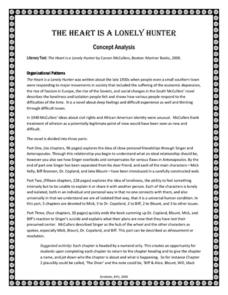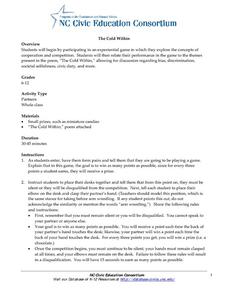Facing History and Ourselves
How Journalists Minimize Bias
Class members are challenged to write a neutral news story about the events they observe in a short video. After sharing their stories in groups and discussing the different perceptions, the class concludes with a video of...
Facing History and Ourselves
The Impact of Identity
How does identity influence the way people respond to events? That is the central question class members grapple with as they examine a political cartoon, read a vignette by Sandra Cisneros, watch of video of police officers discussing...
Facing History and Ourselves
Preparing Students for Difficult Converstaitons
Many of the issues facing 21st Century learners are challenging and even discussing these issues can be a challenge. So how do teachers prepare learners for these difficult conversations? How do instructors create a safe classroom where...
Anti-Defamation League
Exploring Solutions to Address Radical Disparity Concerns
The deaths of Michael Brown, Eric Garner, and Tamir Rice, and the protests that followed the 2014 shootings, are the focus of a current-events activity that asks class members to brainstorm and research possible strategies to address the...
Maryland Department of Education
The Concept of Diversity in World Literature Lesson 5: The Tragic Hero
Should identifying a tragic hero be based on a universal definition or a definition based on the morals and values of a specific culture? As part of a study of Things Fall Apart, class members read Sylvia Plath's "Colossus" and then...
Alabama Department of Archives and History
"Scottsboro Boys": A Trial Which Defined an Age
Here's a must-have resource. Whether your focus is racism, the Great Depression, the "Scottsboro Boys" trial, or part of a reading of To Kill A Mockingbird, the information contained in the seven-page packet will save hours of...
Novelinks
The Heart Is a Lonely Hunter: Concept Analysis
Considering Carson McCullers' The Heart Is a Lonely Hunter for whole-class reading or as a selection for book circles? Check out this resource that overviews the organizational patterns, themes, plot structure, tone, and setting.
Curated OER
Modern Minstrelsy: Exploring Racist Stereotypes in Literature and Life
Satires may be designed to expose a bias to ridicule but if misunderstood can they reinforce that bias? Langston Hughes poem, “Minstrel Man” opens a discussion of racist stereotypes, the minstrel tradition, and the musical, “The...
Curated OER
A South African Storm
Students read "A South African Storm" by Allison Howard and participate in a class discussion that examines Howard's letter for both content and writing form. They write a letter using some of the techniques they identified in Howard's.
Curated OER
Using Picture Books to Celebrate Diversity
Help young learners develop social awareness and tolerance by integrating these books into your lessons.
Curated OER
Martin Luther King Jr's "I Have A Dream" Speech
Invite your class to investigate racism and civil rights by analyzing the great Dr. Martin Luther King's speech. Your learners will read the words from the "I Have a Dream" speech and analyze the political and racial overtones. They will...
Curated OER
The Jacket: Journal Templates Teacher's Guide
Explore this story involving prejudice and racism to enhance learners' comprehension skills. The story The Jacket by Andrew Clements involves an African American boy who is falsely accused of stealing someone's jacket. This teacher's...
Curated OER
Loose Lips
Have your middle and high schoolers analyze instances of celebrities using racial slurs or making prejudiced comments in public. After reading an article, they consider the roots and effects of prejudice and bias. As a class, they...
Curated OER
California's Golden History: 1848-1880
Using a variety of online resources, learners study life and society in California during the gold rush. They use a map to identify area where gold was located, explore pre-selected websites, describe mining practices, and create an...
Curated OER
The Star Fisher
What a terrific way to discuss racism in the 1920's. Learners read a story called The Star Fisher by Laurence Yep. It is about a Chinese American girl who experiences racism and prejudice after moving from Ohio to West Virginia....
K20 Learn
American Exclusivity: The Chinese Exclusion Act
The Chinese Exclusion Act—the first race-based immigration restriction—is echoed in today's debates on the topic. Using graphic organizers and structured discussions, historians consider the reasons behind the act and compare the...
US House of Representatives
Black Americans in Congress Speak Their Mind
To conclude their study of Black Americans in Congress, groups select a statement made by one of the Members, examine the Member's profile on the provided link, and create a display that includes state represented, years of service, an...
US House of Representatives
A Picture is Worth a Thousand Words
Groups select a photograph from one of the four eras of African Americans in Congress and develop a five-minute presentation that provides background information about the image as well as its historical significance. The class compares...
US House of Representatives
Objects in Time
Artifacts can be used to study people and events of the past. That's the takeaway from the fifth instructional activity in a unit study of African Americans who served in Congress. Groups select an artifact associated with a Black...
US House of Representatives
Permanent Interests: The Expansion, Organization, and Rising Influence of African Americans in Congress, 1971–2007
The fourth installment of the seven-instructional activity unit focused on African Americans elected to and serving in the US Congress looks at the period from 1971 through 2007. Class members read a contextual essay that provides...
US House of Representatives
Keeping the Faith: African Americans Return to Congress, 1929–1970
The third lesson in a unit that traces the history of African Americans serving in the US Congress examines the period from 1929 through 1970. After reading a contextual essay that details the few African Americans elected to Congress...
US House of Representatives
“‘The Negroes’ Temporary Farewell,” Jim Crow and the Exclusion of African Americans from Congress, 1887–1929
Despite some advances made during the Reconstruction Era following the Civil War, the period from 1887 through 1929, African Americans serving in Congress suffered severe setbacks due to Jim Crow Laws and voter suppression. Class members...
US House of Representatives
“The Fifteenth Amendment in Flesh and Blood,” The Symbolic Generation of Black Americans in Congress, 1870–1887
The reading of a contextual essay launches a study of Black Americans who served in Congress from 1870 through 1887. Young historians identify the African Americans who served during this period, investigate the ways they won national...
Carolina K-12
The Cold Within
“. . . one of the great challenges to humanity is acknowledging and overcoming a natural tendency to think less of and discriminate against people who are different from us . . .” Launch an examination of competition and cooperation, of...

























